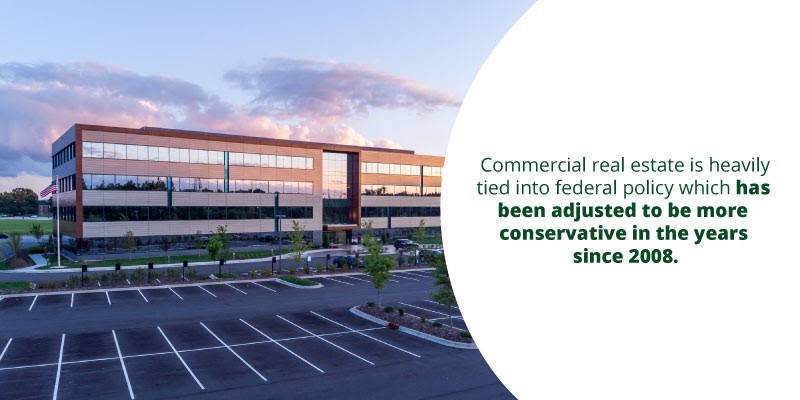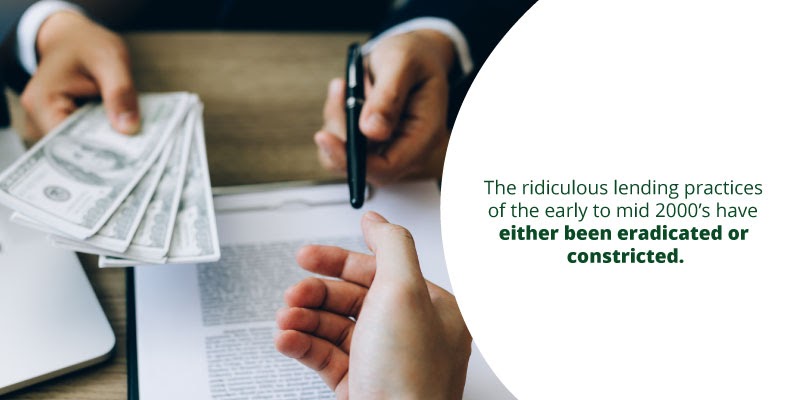
The Great Recession of 2008 has its name for a reason. It has been measured to be the largest economic disaster in American history since the Great Depression of the 1920’s-30’s. The recession was so large that a ripple effect caused a global recession just a year later. While no industry was unaffected, the real estate market took a particularly hard hit. In fact, a collapse in the housing market and other real estate markets in 2007 was one of the falling dominos that led to the inevitable recession just a year later.
Despite all of this (or perhaps because of it), there is reason to believe that our next recession will not take nearly as significant a toll on the commercial real estate market. This is partially due to the fact that the next recession will likely not be as damaging to the overall economy. It is also thanks to administrative efforts to protect the real estate market from present and future turmoil. With this in mind, here is why the next recession likely won’t be as hard on the real estate market.

Why the 2008 Great Recession Crushed the Real Estate Market
There can be no question that any recession would be expected to have a negative impact on the real estate market. The 2008 great recession was particularly damaging to house costs, commercial real estate, and rental vacancy numbers specifically because it was partially caused by a looming housing crisis. After all, when 8.7 million jobs are lost and house prices drop by approximately 28 percent across the country, the value of real estate is going to take a hard hit.
While the housing crisis gets all the press, commercial real estate was heavily impacted by the 2008 Great Recession. It is important to understand that many of the same issues which plagued residential real estate such as lax policies from the Federal Reserve including offering so called “exotic mortgages” did touch the commercial real estate market, but not to the same degree.
The primary cause of the commercial real estate crash in 2008 was an overall recession. Less money for businesses led to lessened spending. Lessened spending led to fewer employees. Fewer employees led to fewer jobs. Fewer jobs led to less need for commercial real estate and/or developing commercial real estate projects. And the list goes on. Still, CRE is heavily tied into federal policy which has been adjusted to be more conservative in the years since 2008. More on this below.

Inevitability of the Next American Recession
It is only natural that the US will soon experience its next recession. There is no economy on earth which is immune to bull and bear markets — such is the way of any large economy. Unfortunately, many economic metrics are pointing towards the next recession coming sooner than later. Here are a few reasons why:
New York Federal Reserve recession probability model: The New York Federal Reserve is one of the most well respected authorities on predicting recessions. Their model has accurately predicted past recessions both in real time and retroactively. The accuracy and detail of this model shows that we are more likely to see a recession in 2020 than any year since 2009.
Inverted yield curve: You may have heard or read something about the inverted yield curve popping up for the first time since the great recession in 2019. Essentially, when short term yields are outperforming long term yields, that is a major red flag of a coming recession.
Unduly inflated economic numbers: The US is currently enjoying low unemployment rates. This is generally great news for CRE investors hoping that a recession is far away. Unfortunately, unemployment is not such a simple statistic. Underemployment numbers and part time employment numbers are on the rise. This is another staple of an upcoming recession.
The Next Recession Won’t be the Same as 2008 for Real Estate
Now that we have established that:
- A recession will be upon us at some time in the relatively near future and
- The last recession was devastating for the real estate market
Why exactly should we expect the next recession to be any different? The simplest answer is that the federal government and banking institutions have (mostly) learned their lessons. The ridiculous lending practices of the early to mid 2000’s have either been eradicated or constricted. The supplemental answer is that the 2008 was one of the most significant economic events in the past 50 years. It is extremely unlikely that the next recession will be as impactful overall. Whether we are talking about the housing market or commercial real estate, a repeat of 2008 is likely very far off.

Going Forward
The best laid plans of mice and men often go awry. Even with a looming recession, it is probably a good idea for commercial real estate veterans to go about their business as usual. The next recession will almost certainly not be the same cataclysmic event as the last one, and the real estate market is expected to remain much more stable this time around. Obviously, all recessions have an economic impact. History may not be repeating itself, but learning from our past mistakes is always wise.




